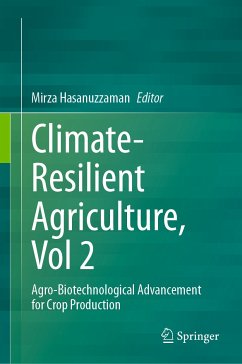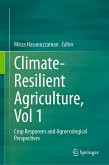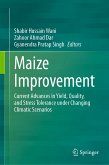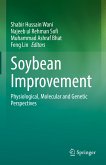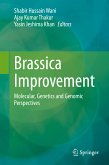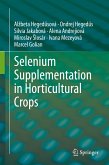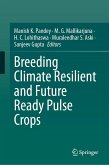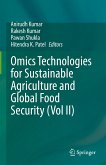Climate-Resilient Agriculture, Vol 2 (eBook, PDF)
Agro-Biotechnological Advancement for Crop Production
Redaktion: Hasanuzzaman, Mirza


Alle Infos zum eBook verschenken

Climate-Resilient Agriculture, Vol 2 (eBook, PDF)
Agro-Biotechnological Advancement for Crop Production
Redaktion: Hasanuzzaman, Mirza
- Format: PDF
- Merkliste
- Auf die Merkliste
- Bewerten Bewerten
- Teilen
- Produkt teilen
- Produkterinnerung
- Produkterinnerung

Hier können Sie sich einloggen

Bitte loggen Sie sich zunächst in Ihr Kundenkonto ein oder registrieren Sie sich bei bücher.de, um das eBook-Abo tolino select nutzen zu können.
Under ongoing climate change, natural and cultivated habitats of major food crops are being continuously disturbed. Such condition accelerates to impose stress effects like abiotic and biotic stressors. Drought, salinity, flood, cold, heat, heavy metals, metalloids, oxidants, irradiation etc. are important abiotic stresses; and diseases and infections caused by plant pathogens viz. fungal agents, bacteria and viruses are major biotic stresses. As a result, these harsh environments affect crop productivity and its biology in multiple complex paradigms. As stresses become the limiting factors…mehr
- Geräte: PC
- ohne Kopierschutz
- eBook Hilfe
- Größe: 35.2MB
![Climate-Resilient Agriculture, Vol 1 (eBook, PDF) Climate-Resilient Agriculture, Vol 1 (eBook, PDF)]() Climate-Resilient Agriculture, Vol 1 (eBook, PDF)242,95 €
Climate-Resilient Agriculture, Vol 1 (eBook, PDF)242,95 €![Maize Improvement (eBook, PDF) Maize Improvement (eBook, PDF)]() Maize Improvement (eBook, PDF)145,95 €
Maize Improvement (eBook, PDF)145,95 €![Soybean Improvement (eBook, PDF) Soybean Improvement (eBook, PDF)]() Soybean Improvement (eBook, PDF)161,95 €
Soybean Improvement (eBook, PDF)161,95 €![Brassica Improvement (eBook, PDF) Brassica Improvement (eBook, PDF)]() Brassica Improvement (eBook, PDF)113,95 €
Brassica Improvement (eBook, PDF)113,95 €- -29%11
![Selenium Supplementation in Horticultural Crops (eBook, PDF) Selenium Supplementation in Horticultural Crops (eBook, PDF)]() Alzbeta HegedusováSelenium Supplementation in Horticultural Crops (eBook, PDF)105,95 €
Alzbeta HegedusováSelenium Supplementation in Horticultural Crops (eBook, PDF)105,95 € ![Breeding Climate Resilient and Future Ready Pulse Crops (eBook, PDF) Breeding Climate Resilient and Future Ready Pulse Crops (eBook, PDF)]() Breeding Climate Resilient and Future Ready Pulse Crops (eBook, PDF)178,95 €
Breeding Climate Resilient and Future Ready Pulse Crops (eBook, PDF)178,95 €![Omics Technologies for Sustainable Agriculture and Global Food Security (Vol II) (eBook, PDF) Omics Technologies for Sustainable Agriculture and Global Food Security (Vol II) (eBook, PDF)]() Omics Technologies for Sustainable Agriculture and Global Food Security (Vol II) (eBook, PDF)113,95 €
Omics Technologies for Sustainable Agriculture and Global Food Security (Vol II) (eBook, PDF)113,95 €-
-
-
This two-volume work highlights the fast-moving agricultural research on crop improvement through the stress mitigation strategies, with specific focuses on crop biology and their response to climatic instabilities. Together with "Climate Resilient Agriculture, Vol 1: Crop Responses and Agroecological Perspectives", it covers a wide range of topics under environmental challenges, agronomy and agriculture processes, and biotechnological approaches, uniquely suitable for scientists, researchers and students working in the fields of agriculture, plant science, environmental biology and biotechnology.
Dieser Download kann aus rechtlichen Gründen nur mit Rechnungsadresse in A, B, BG, CY, CZ, D, DK, EW, E, FIN, F, GR, HR, H, IRL, I, LT, L, LR, M, NL, PL, P, R, S, SLO, SK ausgeliefert werden.
- Produktdetails
- Verlag: Springer International Publishing
- Seitenzahl: 998
- Erscheinungstermin: 9. November 2023
- Englisch
- ISBN-13: 9783031374289
- Artikelnr.: 69420262
- Verlag: Springer International Publishing
- Seitenzahl: 998
- Erscheinungstermin: 9. November 2023
- Englisch
- ISBN-13: 9783031374289
- Artikelnr.: 69420262
- Herstellerkennzeichnung Die Herstellerinformationen sind derzeit nicht verfügbar.
